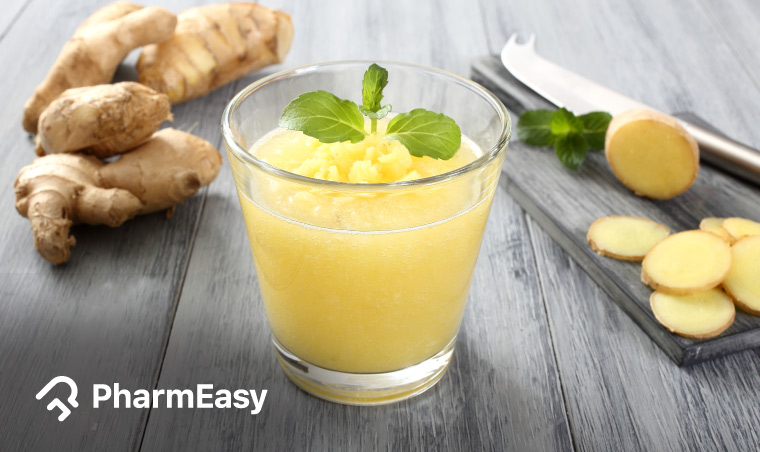Ginger Juice: Uses, Benefits, Side Effects By Dr. Siddharth Gupta
By Dr Siddharth Gupta +2 more

Get,

to manage your symptom
Get your,


4 Cr+ families
benefitted

OTP sent to 9988776655



You’ve successfully subscribed to receive
doctor-approved tips on
Whatsapp

Get ready to feel your best.

Hi There,
Download the PharmEasy App now!!


Register to Avail the Offer
Send OTPBy continuing, you agree with our Privacy Policy and Terms and Conditions

Hi There,
Sign up on PharmEasy now!!
Trusted by 4 crore+ families

OTP sent to 9988776655



You have unlocked 25% off on medicines




Code: NU25
By Dr Siddharth Gupta +2 more
Table of Contents
We all enjoy a cup of piping hot ginger tea during a cold, don’t we? Indian cooking often uses ginger everyday meals to add the characteristic sharp flavour. But did you know that ginger is also known as srngaveram in Sanskrit, which translates to horn root? This is quite interesting because ginger is a horizontal stem (and not a root) from which roots grow. Ginger belongs to the family Zingiberaceae and is related to other common spices cardamom and turmeric all of which belong to the same family. Ginger is one of the most commonly consumed condiments in the world1.

Ginger was used as a tonic root for more than 5000 years to treat many conditions In India and China. The actual origin of ginger is uncertain because it does not grow in the wild. Nowadays, it is grown in humid tropical regions, India being its largest producer. Over 2000 years ago, it was one of the most important articles of trade that was exported to the Roman Empire from India. It has been one of the most sought-after spices since ages. It was held in high regard because of its potential medicinal properties1.
The scientific name of ginger is Zingiber officinale. It can be utilised fresh, preserved, crystallised, dried, pickled, candied or ground, adding a different flavour to the dish in each of these forms. The juice of ginger is also used to make tea or in other health juices. Ginger juice might have many health benefits, some of them are described in the following sections1.
Nutrients present in 100g of ginger and their percentage content2:
Ginger juice might have the following properties:
Ginger is a spice that adds pungent flavour to the food, therefore, it is used in many regions. Moreover, it is a natural herb which might of use as a herbal medicine for various ailments with more research on humans.1 Ginger juice might have the following potential uses for human health.

Various clinical trials were conducted to explore the anti-emetic (nausea and vomiting reducing) potential of ginger. In one of the studies conducted by Sannati et al. it was observed that ginger juice might have the potential to help overcome the nausea and vomiting that is experienced by patients during cancer treatment. This potential effect of ginger juice was seen in both adults and children. Furthermore, in another clinical trial comparing the effectiveness of various antiemetic agents, it was observed that ginger might be more helpful than vitamin B6 (a known anti-emetic agent) in reducing the severity of pregnancy induced nausea and vomiting3.

Several studies have shown that ginger might have a potential to reduce inflammation (exaggerated response of body to injury) which is known to be responsible for many diseases like osteoarthritis (OA). It was seen that ginger might help reduce certain inflammatory components (cytokines) and might also encourage the expression of certain genes (FOXP3) which might result in the reduction of inflammation. Therefore, ginger juice might have the potential to reduce inflammation3.

Pain caused due to various conditions like migraine, lower back pain, muscle pain, etc. and the potential effect of ginger in lowering has been observed in a variety of studies. One study reported that ginger might potentially be able to reduce muscle pain. Studies conducted by Maghbooli et al. and Martin et al. showed that ginger might also help alleviate the symptoms of migraine and headaches. Furthermore, it was also assessed for its potential in lowering lower back pain and chest pain. Therefore, it might be said that ginger juice may have the potential to lower pain. However, its exact mechanism and mode of action is yet to be proven by further research3.

Ginger juice might have the potential to help enhance the emptying of stomach. It might also be helpful in regulating the irregular frequency of stomach emptying (dysrhythmia). Many studies concluded that ginger might have this potential to help with stomach troubles. However, more studies are required to prove these effects3.
Researchers believe that daily consumption of ginger juice in regulated amounts may strengthen your immune system. This property might help people recover from the common cold or flu and stave off chronic diseases. Even then, one should consult their doctor before consuming ginger juice for any disease and avoid self-medicating6.
Dr. Rajeev Singh, BAMS

Ginger might have a potential to exhibit anti-cancer properties. It was seen in a few studies and clinical trials that ginger juice might have the potential to help against colorectal cancer and may help in reducing the levels of cancer markers. However, more research is required to ascertain these possible effects. Moreover, a serious condition such as cancer must be diagnosed and treated by a doctor. Therefore, kindly ensure that you consult a doctor3.

In a study, it was seen that the extracts of ginger might have the potential to lower elevated blood pressure. Therefore, ginger juice might help in hypertension. These effects, however, need to be confirmed by more research. Therefore, kindly consult a doctor and do not self-medicate1.
Though there are studies that show the benefits of ginger juice in various conditions, but these are insufficient and there is a need of further studies to establish the true extent of benefits of ginger juice on human health.
Researchers have found that daily consumption of ginger juice may lower triglycerides, total cholesterol, and bad cholesterol (also known as low-density lipoprotein, or LDL) levels. I strongly recommend the daily consumption of ginger juice in moderate amounts to keep cholesterol levels in check and heart diseases at bay5.
Dr. Siddharth Gupta, B.A.M.S, M.D (Ayu)
You Ayurvedic physician might recommend that you drink ginger juice for certain conditions. The exact dosage and best way of use will be advised by your doctor and you must follow their advice as they are tailored to your health needs. However, you can make ginger juice by following these steps
You must consult a qualified doctor before taking any herbal supplements. Do not discontinue or replace an ongoing treatment of modern medicine with an ayurvedic/herbal preparation without consulting a qualified doctor.
Most of the side effects that were reported seemed to reverse the positive effects that ginger juice might have on the stomach. Ginger juice might have the following side effects:
Also Read: Kiwi Juice: Uses, Benefits, Side Effects By Dr. Smita Barode
Precaution should be taken, and you should discuss with your doctor whether if it safe to drink ginger juice if you are taking any anti-coagulant medicines prescribed by your doctor. Moreover, general precaution should be taken by breastfeeding mothers, pregnant women, elderly individuals and children1.
Also Read: Grape Juice: Uses, Benefits, Side Effects and More!
Ginger might interact with the following drugs and might affect their properties, the way that they act, etc. which might affect the human health in a negative way. Ginger might react with the following drugs:
Also Read: Mango Juice: Uses, Benefits, Side Effects By Dr. Siddharth Gupta
Ginger juice might have potential uses in relieving stomach disturbances, nausea, vomiting, pain, headaches, cancer, inflammatory conditions like osteoarthritis, lower back pain, etc. However, its potential use for the above-stated conditions still needs to be proved by further research. Kindly consult a doctor and do not self-medicate1,3.
The side effects of ginger juice for hair needs to be further explored. Kindly consult your doctor for advice regarding the subject.
No. You should not drink ginger juice daily on your own. Kindly consult your doctor and discuss with them the possible effects that ginger juice might have on your health. You should follow your doctor’s advice which is in your best interest.
As seen in several studies, ginger juice might have the potential to reduce the severity of vomiting in many conditions. Therefore, ginger might be helpful for vomiting. However, you should consult your doctor for advice3.
The possible side effects of ginger juice are, diarrhoea, stomach pain, heartburn, gas, bloating, nausea and epigastric distress (pain and discomfort near the ribs)3.
Multiple studies have shown that ginger juice might have the potential to reduce headaches. However, you should consult your doctor before using it for your headaches3.
Disclaimer: The information provided here is for educational/awareness purposes only and is not intended to be a substitute for medical treatment by a healthcare professional and should not be relied upon to diagnose or treat any medical condition. The reader should consult a registered medical practitioner to determine the appropriateness of the information and before consuming any medication. PharmEasy does not provide any guarantee or warranty (express or implied) regarding the accuracy, adequacy, completeness, legality, reliability or usefulness of the information; and disclaims any liability arising thereof.
Links and product recommendations in the information provided here are advertisements of third-party products available on the website. PharmEasy does not make any representation on the accuracy or suitability of such products/services. Advertisements do not influence the editorial decisions or content. The information in this blog is subject to change without notice. The authors and administrators reserve the right to modify, add, or remove content without notification. It is your responsibility to review this disclaimer regularly for any changes.
Comments

Leave your comment...
You may also like
Comments